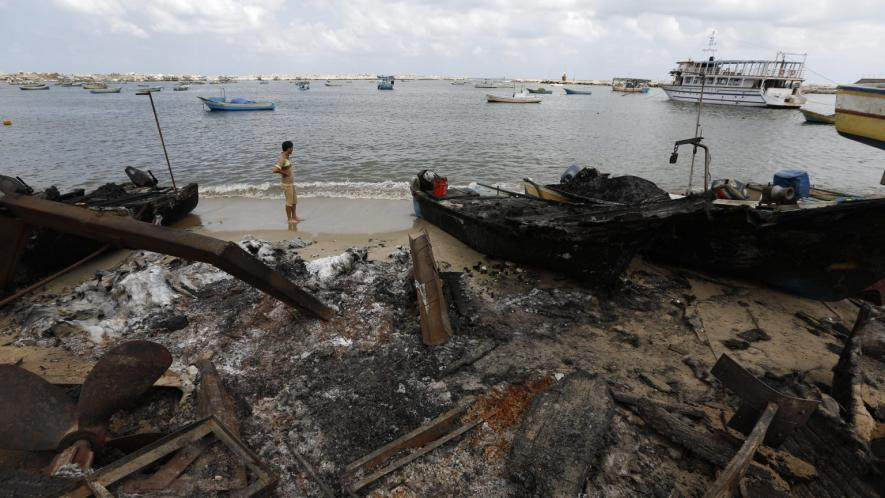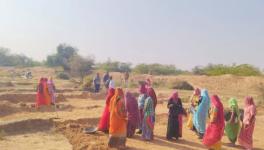Israel Uses the Gaza Fishing Zone as a Tool for Collective Punishment against Palestinians

Destroyed fishing boats at Gaza port. July 2014. Photo : Mohammed Al Baba/Oxfam
Last month Israel’s Coordinator of Government Activities in the Territories (COGAT), a military wing that oversees the affairs of the occupied Palestinian territories, decided to reduce the Gaza fishing areas by half. Israel claimed that the decision was a response to attacks from Gaza. The specific reason cited this time was the launch of the incendiary balloons, which caused a fire in some fields inside the Israeli border. The fishing zone had just opened after being closed for days during the Israeli offensive on Gaza in May. The offensive killed more than 256 Palestinians and injured thousands apart from causing massive damage to the besieged territory’s civilian infrastructure.
Palestinians and human rights groups see Israel’s repeated restrictions on the fishing zone of Gaza as a form of collective punishment of an occupied population, which is completely prohibited under article 33 of the fourth Geneva Convention.
Violation of the Oslo Accords
According to the Oslo accords of 1994, Israel had agreed to allow fishing up to 20 nautical miles into the Mediterranean Sea. Fishing provides livelihood to at least 70,000 Gazans. The Gaza strip is one of the world’s most densely populated regions, with over 2 million people living in an area of around 365 square kilometers. Fishing is a significant source of livelihood and food.
However, Israel has often restricted or stopped fishing in the areas and has never complied with the Oslo accords. It has only allowed fishing up to 12 nautical miles intermittently. In 2006, when Israel imposed a comprehensive land, air, and sea blockade of the region, it further reduced the fishing zone to six and subsequently to three nautical miles. Israel also maintains a heavy naval presence in the waters around Gaza, citing security reasons.
Israel also immediately takes up so-called retaliatory measures whenever an incendiary balloon or rocket is fired from inside the Gaza strip. Its response is usually to restrict or completely stop fishing activities. During the attacks on Gaza in May this year, all fishing activity was stopped. After the ceasefire, fishing was permitted in a limited way.
Gaza’s fishing economy
Gaza’s fishermen have borne the brunt of these restrictions and limitations imposed by Israel. At one time, before the blockade, Gaza had about 10,000 fishermen. Now that number has come down to 4,000 registered with the Gaza Fishermen’s association. They are, in most cases, the sole breadwinners for their families, together making up close to 50,000 people in Gaza. About half of the 4,000 registered fishermen are currently out of work, and 95% of them live below the poverty line — defined as a monthly income of less than 2,294 Israeli shekels or USD 600. Gaza’s fishing sector has witnessed a massive decline as a direct result of Israel’s cruel policies, including restrictions on marine access, fishing exports, entry of raw materials, as well as harassment and killing of fishermen.
Fishery in Gaza has always served as the source of a high level of employment. Besides the 4,000 odd fishermen, many people are dependent on fishing-associated industries, including repairing and retailing.
Before the blockade of Gaza began in 2006, fishermen were allowed to export their fish to the West Bank and Israel. But following the blockade, Israel banned the exports.
Israel has also fatally shot at and injured many fishermen even though most of them were unarmed and posed no threat to Israeli naval vessels or others. The Israeli navy also confiscates fishing boats periodically and imposes up to 500 Israeli shekels (over USD 155) per boat to return them.
Collective punishment
The blockade of Gaza itself is a form of collective punishment where Israel chooses to punish all for the acts of some individuals. It also violates the rule of proportionality in retaliation prescribed in international law. The primitive rockets fired, or the incendiary balloons launched from Gaza as a form of resistance against the blockade and occupation cannot be compared with depriving thousands of people of their employment and one of the primary sources of essential nutrition.
UNICEF noted that in 2017 alone, 40% of the households in Gaza were estimated to be severely or moderately food insecure. It has been noted that, in the context of high food insecurity among the Gazans, the fishing sector could provide an alternative avenue for addressing the problem.
Al Mezan Center for Human rights, a Gaza based human rights organization, said in April this year that Israeli “practices.. amounts to an unlawful collective punishment of the more than two million Palestinian residents, and are among the practices, laws, and policies that constitute Israel’s apartheid regime against the Palestinian people.”
Last year Michael Lynk, special rapporteur on the situation of human rights in the occupied Palestinian Territories, said in the report to the 44th session of the Human Rights Council, “Israel’s strategy to control the Palestinian population violates a foundational rule of virtually every modern legal system: only the guilty can be punished for their acts, and only after a fair process. The innocents can never be made to be punished for the deeds of others.”
The people living in Gaza are already facing several economic problems, including the fall of living standards due to the blockade and closure of all significant sources of income and food. Restricting access to the Gaza fishing zone only adds to the suffering of the people.
Get the latest reports & analysis with people's perspective on Protests, movements & deep analytical videos, discussions of the current affairs in your Telegram app. Subscribe to NewsClick's Telegram channel & get Real-Time updates on stories, as they get published on our website.
























